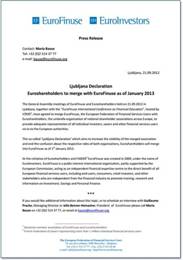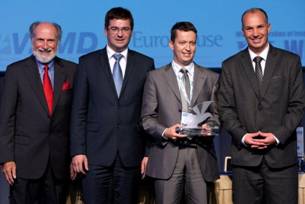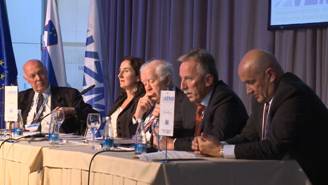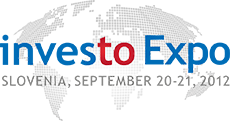In the course of the Investor's Week, the world's largest meeting of investor representatives and shareholders, which was organized by the Pan-Slovenian Shareholders Association (VZMD) within its investo.si - Invest to Slovenia program from 19 to 23 September in Slovenia, the Ljubljana declaration was adopted and presented at the end of the international investor conference and investo Expo exposition in Cankar Hall in Ljubljana. The declaration introduces the unification of two European associations protecting rights and interests of shareholders, investors, and financial services users - Euroshareholders and EuroFinuse, comprising 50 national organizations, which represent over 4 million individual shareholders and investors.
international investor conference and investo Expo exposition in Cankar Hall in Ljubljana. The declaration introduces the unification of two European associations protecting rights and interests of shareholders, investors, and financial services users - Euroshareholders and EuroFinuse, comprising 50 national organizations, which represent over 4 million individual shareholders and investors.
Upon opening of the second day of the international investor conference and investo Expo fair in Cankar Hall in Ljubljana, the VZMD award "Polet" was granted already for the second time for "Model corporate governance of multinational corporations" to
 Gorenje enterprise. The award was handed over by Roger Ganser, the president of the World Federation of Investors (WFI), Uroš Rožič, State Secretary at the Ministry of Economic Development and Technology, Kristijan Verbič, the president of VZMD, and it was received by Jure Marjanovič, the Board Secretary, on behalf of Gorenje.
Gorenje enterprise. The award was handed over by Roger Ganser, the president of the World Federation of Investors (WFI), Uroš Rožič, State Secretary at the Ministry of Economic Development and Technology, Kristijan Verbič, the president of VZMD, and it was received by Jure Marjanovič, the Board Secretary, on behalf of Gorenje.
The award for the "model corporate governance of multinational corporation" was already the second award granted by VZMD as a part of the two-day international investor conference and investo Expo fair, while the traditional VZMD and Euroshareholders award for "Shareholder-friendly company" was received by the pharmaceutical company Krka at the mayor's reception in Ljubljana castle the previous evening. The award was handed over by Jella Benner-Heinacher, the president of Euroshareholders, and Kristjan Verbič, and was received by Peter Skubic, deputy CFO, on behalf of Krka.
 During the international investor conference and investo Expo fair, which was partly supported by the European Commission, 5 panels were debating the current and most significant local, European and global issues regarding financial and capital markets, reforms and investments with the participation of prominent international and national experts, whereby 18 of the most renown Slovenian companies and institutions were introduced to over a hundred foreign participants from 55 countries as well as to other guests and visitors.
During the international investor conference and investo Expo fair, which was partly supported by the European Commission, 5 panels were debating the current and most significant local, European and global issues regarding financial and capital markets, reforms and investments with the participation of prominent international and national experts, whereby 18 of the most renown Slovenian companies and institutions were introduced to over a hundred foreign participants from 55 countries as well as to other guests and visitors.
Due to the resounding success and acknowledgment VZMD received in view of efficient execution of the Investor's week and Investo Expo the Ljubljana declaration is certainly the most significant milestone in the protection of rights and interests of shareholders, investors, and financial services users and respective regulations in the European Community. Through the Ljubljana declaration, which brings together all European associations protecting rights and interests of shareholders, investors, and financial services users as of January 1st 2013, the Slovenian capital shall be recorded in the chronicles of shareholding, investing and regulating of financial and capital markets in the European Community.
The proclamation of Ljubljana declaration acknowledges the work and activities of VZMD co-workers, as well as the preparation of all bilateral and multilateral gatherings which brought about the unanimous decision of the merger at the two separate meetings of Euroshareholders and EuroFinuse in Cankar hall in Ljubljana on 21 September. This historic decision is known as the "Ljubljana declaration".







 Gorenje enterprise. The award was handed over by Roger Ganser, the president of the World Federation of Investors (WFI), Uroš Rožič, State Secretary at the Ministry of Economic Development and Technology, Kristijan Verbič, the president of VZMD, and it was received by Jure Marjanovič, the Board Secretary, on behalf of Gorenje.
Gorenje enterprise. The award was handed over by Roger Ganser, the president of the World Federation of Investors (WFI), Uroš Rožič, State Secretary at the Ministry of Economic Development and Technology, Kristijan Verbič, the president of VZMD, and it was received by Jure Marjanovič, the Board Secretary, on behalf of Gorenje.







